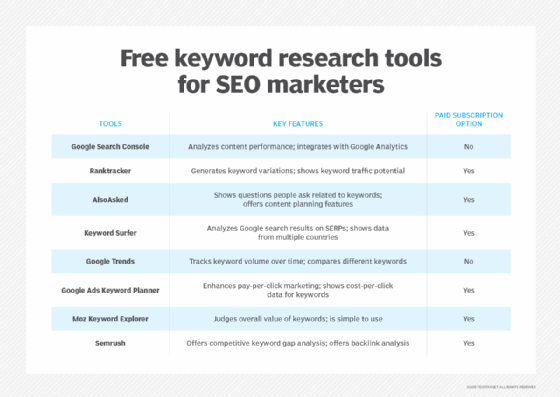Keyword research SEO tools help identify the best keywords for your website. They improve search engine rankings and drive traffic.
Keyword research is vital for effective SEO. These tools analyze search volume, competition, and trends. They help you choose the right keywords to target. This boosts your website’s visibility on search engines like Google. Using these tools, you can understand what your audience is searching for.
| Tool | Features | Pricing | Visit Site |
|---|---|---|---|
| Ahrefs | Comprehensive keyword research, competitor analysis, SERP overview, rank tracking | Starting at $99/month | visit site |
| SEMrush | Keyword and competitor research, site audits, PPC analysis, backlink tracking | Starting at $119.95/month | visit site |
| Moz Keyword Explorer | Keyword suggestions, SERP analysis, difficulty scores, click-through rates | Starting at $99/month | visit site |
| Google Keyword Planner | Keyword search volume, competition, CPC estimates | Free (with Google Ads) | visit site |
| Ubersuggest | Keyword suggestions, SEO analysis, content ideas, competitor insights | Free, $12-$40/month for premium | visit site |
| KeywordTool.io | Generates keywords from Google, Bing, YouTube, and more, with search volume and CPC | Free, $89-$199/month | visit site |
| SpyFu | Competitor keyword analysis, PPC research, backlink analysis | Starting at $39/month | visit site |
| KWFinder | Keyword research, SEO metrics, search volume, competition analysis | Starting at $29/month | visit site |
| AnswerThePublic | Visual keyword research, question-based content ideas | Free, $99/month for Pro | visit site |
| Serpstat | Keyword analysis, competitor research, rank tracking, backlink analysis | Starting at $55/month | visit site |
You can also find long-tail keywords that are less competitive. This strategic approach ensures your content meets user intent. Popular tools include Google Keyword Planner, Ahrefs, and SEMrush. They offer comprehensive data and insights. With the right keywords, your content can rank higher and attract more visitors.
Introduction To Seo And Keyword Research
Search Engine Optimization (SEO) and keyword research are crucial for online success. Understanding SEO and keyword research helps your website rank higher. This introduction covers the basics and why they matter.
Importance Of Keywords
Keywords are the words people type into search engines. Using the right keywords helps people find your website. They are essential for driving traffic. Keywords guide search engines to your content. Proper use of keywords improves your site’s visibility. Choose keywords that are relevant to your content. This way, visitors get what they seek.
There are two types of keywords:
- Short-tail keywords: These are 1-2 words long. Example: “shoes”
- Long-tail keywords: These are 3 or more words. Example: “best running shoes for men”
How Seo Impacts Your Website
SEO helps your website rank higher on search engines. Higher ranking means more visitors. More visitors can lead to more sales or engagement. Good SEO practices make your site user-friendly. This includes fast load times and easy navigation. Both factors improve user experience. Search engines reward sites with good user experience.
Here is a simple table on SEO impacts:
| SEO Practice | Impact |
|---|---|
| Using relevant keywords | Increases search visibility |
| Optimizing website speed | Improves user experience |
| Creating quality content | Engages visitors longer |

Credit: backlinko.com
Types Of Seo Tools
SEO tools are essential for improving your website’s search engine ranking. They help you find the best keywords, analyze competitors, and optimize your content. Below, we explore different types of SEO tools that can boost your SEO efforts.
Free Vs Paid Tools
There are many free SEO tools available. They offer basic features but are effective for small tasks. Some popular free tools include:
- Google Keyword Planner
- Ubersuggest
- Answer The Public
Free tools are great for beginners or those on a budget. They provide valuable insights without any cost.
On the other hand, paid SEO tools offer advanced features and in-depth analysis. They often come with additional support and updates. Some well-known paid tools are:
- Ahrefs
- SEMrush
- Moz Pro
Paid tools are ideal for professionals and businesses. They provide comprehensive data and save time.
Browser Extensions
Browser extensions make SEO tasks easier. They integrate directly into your web browser and provide real-time data. Some popular browser extensions for SEO include:
- Keywords Everywhere
- SEOquake
- Check My Links
These extensions help you analyze web pages quickly. They offer features like keyword density, on-page SEO analysis, and link checking.
Using browser extensions simplifies your workflow. You get instant insights without leaving your browser.
Top Keyword Research Tools
Choosing the right keyword research tools can boost your SEO strategy. These tools help you find the best keywords to target. This section covers the top keyword research tools in the market.
Google Keyword Planner
Google Keyword Planner is a free tool from Google. It helps you find new keywords and see their search volume. You can also see the competition level for each keyword. This tool is great for beginners. It offers basic but essential insights.
- Free to use
- Shows search volume
- Displays competition level
Semrush
SEMrush is a powerful SEO tool. It offers in-depth keyword analysis. You can track your competitors’ keywords. SEMrush also provides keyword difficulty scores. This helps you choose the easiest keywords to rank for.
| Features | Benefits |
|---|---|
| Competitor Analysis | Understand your competitors’ strategy |
| Keyword Difficulty Scores | Choose easy-to-rank keywords |
Ahrefs
Ahrefs is another top keyword research tool. It offers a vast keyword database. Ahrefs provides accurate keyword difficulty scores. You can also see the estimated traffic for each keyword. This tool helps you find keywords that can drive traffic to your site.
- Huge keyword database
- Accurate keyword difficulty scores
- Estimated traffic for keywords
These tools are essential for effective SEO strategies. They help you find the best keywords to target. Using these tools can improve your website’s search engine ranking.

Credit: www.searchenginejournal.com
How To Use Keyword Research Tools
Keyword research is essential for any successful SEO strategy. Using keyword research tools helps identify the best keywords for your content. These tools provide insights into search volume, competition, and keyword difficulty. Here’s a guide on how to use keyword research tools effectively.
Finding Relevant Keywords
Start with a broad topic related to your niche. Use tools like Google Keyword Planner or Ahrefs. Enter the broad topic into the tool’s search bar. The tool will generate a list of related keywords. Look for keywords with high search volume and low competition. This combination helps you rank better on search engines.
Here’s an example:
| Keyword | Search Volume | Competition |
|---|---|---|
| SEO tips | 10,000 | Low |
| Keyword research tools | 5,000 | Medium |
Use long-tail keywords to target specific searches. They usually have lower competition and higher conversion rates.
Analyzing Keyword Difficulty
Keyword difficulty tells you how hard it is to rank for a keyword. Tools like Moz and SEMrush offer keyword difficulty scores. A score above 60 is tough to rank for, while below 40 is easier.
Follow these steps to analyze keyword difficulty:
- Enter the keyword into the research tool.
- Check the keyword difficulty score.
- Look at the top-ranking pages for that keyword.
- Analyze their content, backlinks, and domain authority.
Choose keywords with a balance of good search volume and lower difficulty scores. This strategy helps you compete more effectively.
Remember, effective keyword research is the foundation of your SEO efforts. Using the right tools and strategies will improve your content’s visibility and ranking.
Advanced Keyword Strategies
Delving into advanced keyword strategies can significantly boost your SEO efforts. Two key strategies include long-tail keywords and LSI keywords. These approaches help target specific audiences and improve search engine rankings.
Long-tail Keywords
Long-tail keywords are phrases that are more specific and longer. They typically have lower search volumes but higher conversion rates. Using long-tail keywords can help attract targeted traffic to your site. Here are some examples:
- “Best SEO tools for small businesses”
- “How to use keyword research tools effectively”
- “Affordable keyword research tools for beginners”
These keywords address specific queries. They match the user’s intent closely. Tools like Google Keyword Planner and Ahrefs can help identify long-tail keywords. Incorporate these keywords into your content to reach niche audiences.
Lsi Keywords
LSI keywords (Latent Semantic Indexing) are terms related to your main keyword. They help search engines understand your content better. Using LSI keywords can improve the relevance and depth of your content. Here is a table showcasing examples:
| Main Keyword | LSI Keywords |
|---|---|
| Keyword Research Tools | SEO tools, search engine optimization, keyword analysis |
| Content Marketing | content strategy, digital marketing, online content |
Using tools like LSIGraph can help find LSI keywords. These keywords should naturally fit within your content. This enhances the topic’s coverage and improves SEO performance.
Tracking Keyword Performance
Tracking keyword performance is critical for SEO success. You need to know which keywords drive traffic and conversions. This section covers how to set up analytics and interpret data.
Setting Up Analytics
First, set up Google Analytics to track keyword performance. Follow these steps:
- Create or log into your Google Analytics account.
- Link your website to Google Analytics.
- Enable site search tracking.
- Connect Google Search Console to Analytics.
Use Google Search Console for detailed keyword data. It shows search queries, clicks, and impressions.
Interpreting Data
Understand what the data means. Look at click-through rates (CTR) and average position. High CTR means people like your content.
Use a table for easy viewing:
| Metric | Meaning |
|---|---|
| Clicks | Number of times users clicked your link |
| Impressions | Number of times your link appeared in search |
| CTR | Clicks divided by impressions |
| Average Position | Average ranking of your link |
High impressions but low clicks? Your meta description or title tag may need improvement. Use this data to refine your SEO strategy.
Common Mistakes In Keyword Research
Keyword research is the backbone of any successful SEO strategy. However, many make mistakes that can harm their rankings. Here, we discuss common mistakes in keyword research.
Overstuffing Keywords
Overstuffing keywords is a frequent mistake. Many think more keywords equal better rankings. This is false. Google and other search engines penalize this practice.
Instead, use keywords naturally in your content. Aim for a keyword density of 1-2%. This keeps your content readable and SEO-friendly.
Ignoring Search Intent
Ignoring search intent is another common error. Not all keywords mean the same thing. Users search for various reasons. Failing to match this can hurt your rankings.
To avoid this, understand the intent behind each keyword. Are users seeking information, products, or services? Tailor your content to meet these needs.
| Common Mistake | Impact | Solution |
|---|---|---|
| Overstuffing Keywords | Penalized by search engines | Use keywords naturally |
| Ignoring Search Intent | Poor user engagement | Understand keyword intent |
- Overstuffing Keywords: Keep keyword density at 1-2%.
- Ignoring Search Intent: Match your content to user intent.
Future Trends In Keyword Research
The landscape of keyword research is constantly evolving. As technology advances, so do the tools and techniques we use. Keeping up with future trends is crucial for staying ahead in SEO. Below, we explore some emerging trends in keyword research.
Voice Search Optimization
Voice search is becoming more popular. People use devices like Alexa and Siri. Optimizing for voice search is now essential.
- Focus on natural language keywords.
- Use question-based keywords.
- Optimize for local searches.
Voice search queries are often longer. They sound more conversational. This means you should use longer phrases and full sentences.
Ai And Machine Learning
AI and machine learning are transforming keyword research. These technologies can predict trends. They offer more accurate data.
| Benefits | Examples |
|---|---|
| Predicting search trends | Google’s RankBrain |
| Analyzing user behavior | SEMrush |
AI tools can analyze vast amounts of data quickly. They help identify new keyword opportunities. This makes your SEO strategy more effective.
Embracing these trends is crucial. They will shape the future of keyword research. Stay ahead by incorporating them into your SEO strategy.
Conclusion And Next Steps
In the dynamic world of SEO, keyword research tools are crucial. They help optimize content, drive traffic, and improve rankings. As we wrap up, let’s explore the next steps for continuous success.
Continuous Learning
SEO is always evolving. Staying updated with the latest trends is essential. Join online courses and webinars to enhance your skills.
Here are some resources:
- SEO Blogs: Follow top SEO blogs for regular updates.
- Webinars: Attend webinars by industry experts.
- Online Courses: Enroll in SEO courses on platforms like Coursera or Udemy.
Make learning a part of your routine. This will help keep your strategies effective.
Adapting To Changes
SEO algorithms change frequently. Adapt your strategies to stay ahead. Monitor algorithm updates and adjust your tactics accordingly.
Key areas to focus on:
- Content Quality: Ensure your content is valuable and relevant.
- User Experience: Improve site speed and mobile-friendliness.
- Backlink Profile: Build quality backlinks from reputable sources.
Use tools to track changes and measure performance. This ensures your SEO efforts are always on point.
By committing to continuous learning and adapting to changes, you can master SEO. Use these strategies to stay ahead in the competitive digital landscape.

Credit: www.techtarget.com
Frequently Asked Questions
What Are The Best Keyword Research Tools?
The best keyword research tools include Google Keyword Planner, Ahrefs, SEMrush, Moz, and Ubersuggest. They provide valuable insights into search volumes, keyword difficulty, and competition.
How Does Keyword Research Help Seo?
Keyword research helps SEO by identifying high-value search terms that drive traffic. It optimizes content to match user intent and improve search engine rankings.
Are Free Keyword Research Tools Effective?
Free keyword research tools can be effective but often have limitations. They provide basic insights, but premium tools offer more comprehensive data and features.
How Often Should I Perform Keyword Research?
Perform keyword research regularly, ideally every few months. It helps you stay updated with changing trends, competition, and search behavior.
Conclusion
Mastering keyword research with the right SEO tools can boost your website’s visibility. Use these tools to uncover valuable keywords. Optimize your content to attract more organic traffic. Stay ahead by continuously refining your keyword strategy. Implement these insights to drive better search engine rankings and grow your online presence.














